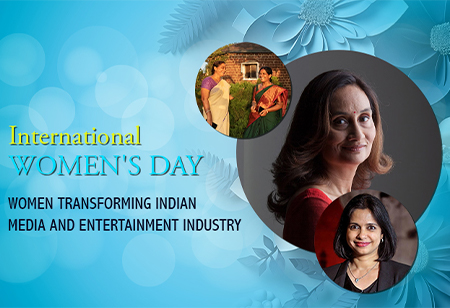International Women's Day: Women Transforming Indian Media and Entertainment Industry
International Women's Day is a global celebration of women's accomplishments and gender equality. The 2025 theme, "For ALL Women and Girls: Rights, Equality, Empowerment," highlights the importance of accelerating the advancement of gender equality.
In order to address systemic biases and barriers that affect women in a range of fields, this theme calls for swift and decisive action. It motivates people, groups, and communities to put into practice and spread successful tactics for women's advancement. We commemorate the hardships, triumphs, and trajectories of women on this International Women's Day who have not only succeeded in their careers but also cleared the path for authentic female representation in India's varied media environment.
Women in India's media and entertainment sector are now crafting their own compelling stories, in a nation where storytelling has long been a component of cultural expression. From behind the camera to top media companies, from newsrooms to movie sets, women professionals are dispelling stereotypes and changing a field that used to give them few on- and off-screen roles.
The Changing Landscape: From Tokenism to Leadership
Women's progress in India's entertainment and media sectors is indicative of a broader social shift. What began as token representation has developed into true creative control and leadership. These days, women lead investigative journalism, run large production companies, and produce content that defies social norms and connects with viewers.
This shift has been especially significant in a field that has historically seen women through a narrow lens, typically reducing them to stereotypical roles that support traditional gender expectations. The increasing representation of women in decision-making positions has had a direct influence on content creation, resulting in more nuanced and diverse representations of female characters on media platforms.
Journalism: Reclaiming the Narrative
Expanding coverage beyond traditional "women's issues" to include politics, the economy, crime, and international affairs has been made possible in large part by female journalists and editors. By regularly bringing attention to stories that would otherwise go unreported, they have introduced fresh viewpoints to newsrooms.
While anchors like Faye D'Souza have revolutionized broadcast journalism through sharp questioning and adherence to factual reporting, investigative journalists like Rana Ayyub have courageously sought the truth in challenging situations. Even though they work in fields where women still face particular obstacles, their work shows that journalistic excellence is gender-neutral.
The digital revolution has further democratized media access, allowing women journalists to create their own platforms and interact directly with audiences. This shift has allowed them to get around traditional gatekeepers and create spaces where diverse voices can thrive.
"The responsibility of the media is to report news that educates, informs, and empowers society, not just to chase sensationalism”, stated Shobhana Bhartia, Chairperson & Editorial Director, HT Media.
Advertising and Media: Redefining Images and Impressions
Female executives in media management and advertising are questioning the imagery that influences public opinion. Messages that celebrate women's strength, intelligence, and diversity are replacing campaigns that once relied on regressive stereotypes.
The "pink it and shrink it" mentality that once dominated female-oriented advertising is giving way to new strategies that are being pioneered by female creative directors and marketing executives. Rather, companies are adopting real representation that reflects the complexity of women's lives and goals.
Media organizations with female executives at the helm have often shown a greater dedication to inclusive content strategies and diverse hiring practices. Corporate cultures have been gradually changed by their leadership to become more gender sensitive and aware.
Digital Frontiers: New Platforms and Possibilities
Women now have more opportunities than ever before in the media and entertainment industries given the digital revolution. By addressing topics and communities that the mainstream media overlooks, YouTubers, podcasters, and social media content producers are building followings and companies outside of established industry structures.
Stories are being told and consumed differently thanks to female-led digital startups in media technology, content production, and distribution. In addition to creating profitable companies, these business owners are establishing new benchmarks for the industry by implementing gender-sensitive practices early on.
Because of the democratization of audience access brought about by platforms like YouTube and Instagram, female creators can now display their skills without waiting for institutional approval. Once thought to be a male domain, comedy has seen a surge in talented female performers who are interacting directly with audiences through digital platforms.
The Path Ahead: Transformation through Representation
In addition to greater representation, significant adjustments to industry structures, procedures, and content are also necessary for the future of women in India's media and entertainment sector. Beyond merely increasing the number of women in the room, the objective is to establish settings where women's viewpoints actually influence organizational culture and media output.
This change will require constant attention to prevent reversals, especially as social conservatism and economic pressures threaten to undo gains. It will require allies of both sexes who recognize that media content with a range of viewpoints is more powerful and impactful.
Most importantly, it will necessitate acknowledging that women in media and entertainment do not constitute a homogeneous group. A woman director in mainstream Bollywood has very different experiences and challenges than a community radio producer in rural India or a transgender journalist in regional media.
"Community media is not just about broadcasting—it is about listening, understanding, and giving a voice to those who never had one”, says Masanagari Narsamma & Algole Narsamma, Founders, Sangham Radio.
Conclusion: Celebrating Progress While Moving Forward
On International Women's Day, we celebrate the pioneers who, frequently at great personal expense, paved the way for India's media and entertainment sectors. We acknowledge the younger generation of professionals who are expanding opportunities and fostering more welcoming workplaces. And we look forward to a future in which gender is no longer a barrier to full participation and expression.
"Success in media is about balancing creativity with commerce, and building a business that not only entertains but also has a meaningful impact on its audience”, says Jyoti Deshpande, CEO, Viacom18.
🍪 Do you like Cookies?
We use cookies to ensure you get the best experience on our website. Read more...






